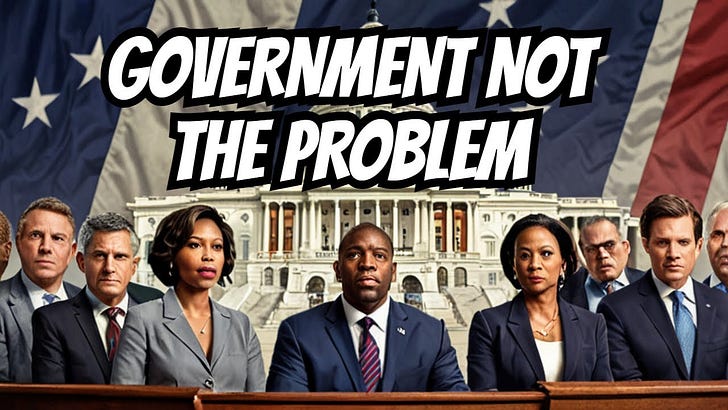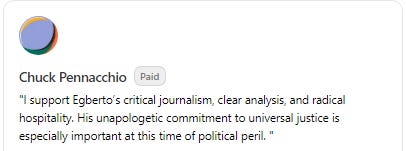Anyone who tells you the government is the problem is telling you that you are incompetent, really!
Reagan has always been wrong—the government is not the problem. We have sold our souls to the corporation, and it is time to take them back.
A quick but important note before reading this prescient article
As of today, we have 9.7 thousand followers and 94 supporting (paid) subscribers. Misinformation funded by the deep pockets of our Oligarchy floods the internet. We are using all of our platforms on-air, online, and in publications to counter that. We ask that you invest the equivalent of less than a coffee to ensure we can keep doing this. Please invest in a Democracy that serves all of us by becoming a paid subscriber. It comes with many benefits.
Government is not the problem.
When Ronald Reagan proclaimed, “Government is not the solution to our problem; government is the problem,” he unleashed a meme that has reverberated through American society for decades. This rhetoric, echoing through the halls of power and the corridors of public opinion, has fundamentally shaped how many view government. But what does this statement truly imply? When analyzed critically, it becomes clear that such a proclamation is not just an indictment of bureaucratic inefficiency or political corruption; it is a profound insult to the very concept of democracy and the competence of the American people.
The Origins of Anti-Government Rhetoric
The notion that government is inherently problematic did not originate with Reagan. It is a sentiment carefully cultivated by conservative think tanks and corporate interests long before his presidency. The Powell Memo, written in 1971 by Lewis Powell, a future Supreme Court Justice, is pivotal in this narrative. It outlined a strategy for the business community to influence politics and public opinion to preserve “free-market capitalism” against what was perceived as an onslaught of regulatory overreach and leftist ideology.
The Powell Memo and subsequent conservative efforts were designed to erode trust in government institutions. By framing the government as inefficient and corrupt, these interests aimed to shift power away from public institutions and toward private corporations. This strategy has been remarkably successful, resulting in widespread skepticism toward government and a preference for privatization in many sectors of society.
Government as “We the People”
At its core, government in a democratic society is an embodiment of “we the people.” It is a mechanism through which citizens collectively decide on the rules and policies that shape their lives. By declaring that the government is the problem, detractors are effectively saying that the people themselves are the problem. This is a deeply cynical and disempowering message.
When people are told that their government is inherently flawed, they are being told that their ability to govern themselves is flawed. This rhetoric serves to neuter the democratic impulse and pave the way for autocratic tendencies within the private sector. When critics argue for turning functions over to the private sector, they are not advocating for a vibrant free market where small businesses thrive. Instead, they are promoting the interests of large corporations and wealthy individuals who seek to escape public accountability.
The Myth of Corporate Efficiency
The idea that private corporations can manage resources more efficiently than the government is a central tenet of neoliberal thought. However, this notion often ignores the ways in which corporations operate to maximize profit at the expense of the public good. Consider the concept of corporate personhood, which allows corporations to function as legal entities separate from their shareholders and executives. This legal framework enables corporate leaders to engage in activities that can be detrimental to workers, consumers, and the environment while escaping personal liability.
A prime example of this is Bain Capital, the private equity firm once led by Mitt Romney. Bain’s business model involved acquiring companies, extracting as much value as possible, and then leaving these companies to flounder or go bankrupt. Workers lost their jobs, pensions were gutted, and communities were devastated, all while Bain Capital and its executives walked away with substantial profits. This predatory behavior exemplifies how corporate interests often diverge sharply from the public interest.
The Consequences of Anti-Government Sentiment
The rhetoric that undermines government has tangible and often devastating consequences. It fosters a culture of distrust and disengagement, making it harder to mobilize collective action to address societal problems. When citizens believe that the government is incapable of solving problems, they are less likely to participate in the political process, leading to lower voter turnout and diminished civic engagement.
Moreover, the privatization of essential services often leads to higher costs and reduced access. The American healthcare system is a case in point. The healthcare industry, dominated by private entities, routinely charges exorbitant prices for basic services. An x-ray that costs $1,000 is not a reflection of superior efficiency but of a system designed to extract maximum profit from patients and insurance companies. This privatized model results in a healthcare system that is the most expensive in the world while delivering mediocre outcomes compared to other developed nations.
Reclaiming Government for the People
To counter the pernicious effects of anti-government rhetoric, it is crucial to reclaim the narrative around government and democracy. We must remember that government is a tool for collective action, a means through which we can achieve goals that are beyond the reach of individuals acting alone. It is through government that we can ensure access to education, healthcare, and a clean environment. It is through government that we can protect workers’ rights, ensure public safety, and provide a social safety net.
Rebuilding trust in government requires electing leaders who are committed to serving the public interest rather than corporate interests. It involves holding those leaders accountable and demanding transparency and integrity in governance. It also means recognizing and resisting the influence of money in politics, which has distorted democratic processes and prioritized the interests of the wealthy over the needs of the many.
Conclusion
The assertion that government is the problem is not just a critique of bureaucratic inefficiency; it is a direct attack on the democratic principle that we, the people, have the power and the right to govern ourselves. By undermining trust in government, this rhetoric serves the interests of those who benefit from weakened public institutions and unregulated markets. To build a more just and equitable society, we must reaffirm our commitment to democratic governance and recognize that a government truly of, by, and for the people is not the problem but the solution.
Can we count on you to help us reach our goal of 25 new paid subscriptions by month’s end?
The other side has big donors and everyday citizens who invest heavily in platforms that lie and misinform. All we have is you. So, please invest in our media outlet by clicking the subscribe button below to become a paid subscriber. You won’t miss that coffee, but it will make a difference in our politics as we spread the truth about our policies and progressive politics. All paid subscribers get to read my five books on this platform and all subsequent books I write. They will also be privy to subsequent incentives.








Today's nine most terrifying words: "I'm from Private Equity and I'm here to help."
EFFICIENCY SCORECARD
Public system (Medicare): overhead 2%.
Corporate system (Medicare Advantage): overhead up to 40%.